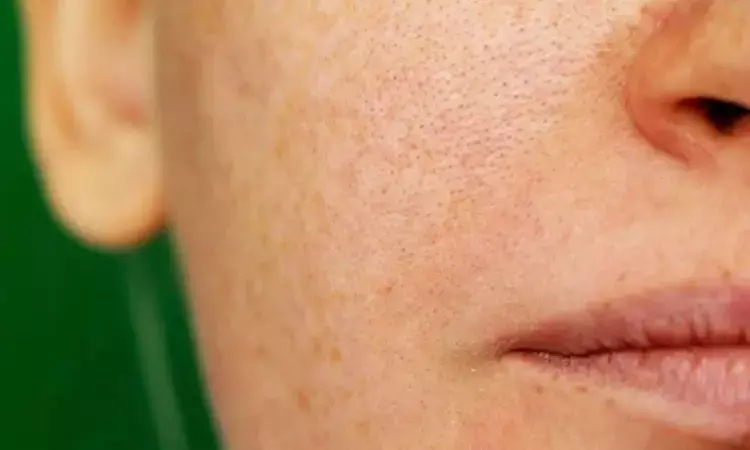- Home
- Medical news & Guidelines
- Anesthesiology
- Cardiology and CTVS
- Critical Care
- Dentistry
- Dermatology
- Diabetes and Endocrinology
- ENT
- Gastroenterology
- Medicine
- Nephrology
- Neurology
- Obstretics-Gynaecology
- Oncology
- Ophthalmology
- Orthopaedics
- Pediatrics-Neonatology
- Psychiatry
- Pulmonology
- Radiology
- Surgery
- Urology
- Laboratory Medicine
- Diet
- Nursing
- Paramedical
- Physiotherapy
- Health news
- Fact Check
- Bone Health Fact Check
- Brain Health Fact Check
- Cancer Related Fact Check
- Child Care Fact Check
- Dental and oral health fact check
- Diabetes and metabolic health fact check
- Diet and Nutrition Fact Check
- Eye and ENT Care Fact Check
- Fitness fact check
- Gut health fact check
- Heart health fact check
- Kidney health fact check
- Medical education fact check
- Men's health fact check
- Respiratory fact check
- Skin and hair care fact check
- Vaccine and Immunization fact check
- Women's health fact check
- AYUSH
- State News
- Andaman and Nicobar Islands
- Andhra Pradesh
- Arunachal Pradesh
- Assam
- Bihar
- Chandigarh
- Chattisgarh
- Dadra and Nagar Haveli
- Daman and Diu
- Delhi
- Goa
- Gujarat
- Haryana
- Himachal Pradesh
- Jammu & Kashmir
- Jharkhand
- Karnataka
- Kerala
- Ladakh
- Lakshadweep
- Madhya Pradesh
- Maharashtra
- Manipur
- Meghalaya
- Mizoram
- Nagaland
- Odisha
- Puducherry
- Punjab
- Rajasthan
- Sikkim
- Tamil Nadu
- Telangana
- Tripura
- Uttar Pradesh
- Uttrakhand
- West Bengal
- Medical Education
- Industry
Oral ketotifen, famotidine with sunscreen bests sunscreen alone for treating melasma : Study

Brazil: A recent study showed that a combo of sunscreen plus oral ketotifen with famotidine improved facial melasma more than the use of sunscreen alone at 60 days. The study appears in the Journal of the European Academy of Dermatology and Venereology.
Ketotifen decreases the release of bioactive mediators, such as leukotrienes, histamine, and proteases. It has been suggested as a treatment for photoaging after being found to prevent mast cell deposition, degranulation, skin thickening, and wrinkles in UV irradiated hairless mice. Famotidine is an H2-receptor antagonist that suppresses histamine-mediated melanogenesis and dendricity in cultured human melanocytes, whereas H1 and H3 antagonists have no inhibitory effect.
Upper dermal mast cells are more prominent in melasma than in unaffected adjacent skin and are markers of chronic photo exposure. As mast cells degranulate under-stimulation [e.g.heat, ultraviolet rays (UV) exposure], and several treatments for melasma, such as oral tranexamic acid, topical nicotinamide, and topical corticosteroids reduce them, such cells are thought to play a key role in melasma pathogenesis. Till now, no studies have explored the stabilization of mast cells and H2 blockade as a potential therapeutic strategy in melasma.
To fill the knowledge gap described above, J.A.F Dias, Departamento de Dermatologia, UNESP, Botucatu, Brazil, and the team aimed to evaluate the efficacy, safety, and tolerability of oral 1mg ketotifen and 40 mg famotidine (AH) in association with broad-spectrum tinted sun-screen for the treatment of facial melasma.
For this purpose, they performed a prospective, randomized, double-blinded, placebo-controlled study conducted in three Brazilian dermatologic centers from March 2020 to February 2021.
The study included a total of 74 women aged between 20 and 55 years, with facial melasma and without treatment (except sunscreen) for the last 30 days or more (except sunscreen). They were randomized to receive the combination of AH, or placebo, twice a day, for 60 days.
The primary outcome was the change from the baseline Modified Melasma Area Severity Score (mMASI) assessed at the day of inclusion (D0) and 60 days after the inclusion (D60).
The participants were also evaluated regarding Melasma Quality of LifeIndex (MELASQoL), and the colorimetry of their melasma and adjacent unaffected skin (Dif-L* – a difference in colorimetric luminosity between them). The Global Aesthetic ImprovementScale was used to assess the difference in the global appearance of the melasma through standardized photographs (D0 vs. D60).
Following were the study's key findings:
- At 60 days, the treatment group had greater reduction in Modified Melasma Severity Index scores (23% vs 13%) and improved colorimetry.
- More patients in the treatment group perceived improvement (57% vs 42%), but this was not statistically significant.
- Somnolence was reported by 48% of the treatment group and 22% of the placebo group.
"This study provides proof-of-concept evidence for targeting mast cells as a possible treatment for melasma, which should be explored in combination with other strategies to maximize their benefits and prevent the relapse of melasma, after bleaching," wrote the authors.
"Oral ketotifen associated with famotidine was well tolerated and promoted a slight improvement of facial melasma," they concldued.
Reference:
The study titled, "Oral ketotifen associated withfamotidine for the treatment offacial melasma: a randomized,double-blind, placebo-controlled trial," is published in the Journal of the European Academy of Dermatology and Venereology.
DOI: https://onlinelibrary.wiley.com/doi/epdf/10.1111/jdv.17692
Dr Kamal Kant Kohli-MBBS, DTCD- a chest specialist with more than 30 years of practice and a flair for writing clinical articles, Dr Kamal Kant Kohli joined Medical Dialogues as a Chief Editor of Medical News. Besides writing articles, as an editor, he proofreads and verifies all the medical content published on Medical Dialogues including those coming from journals, studies,medical conferences,guidelines etc. Email: drkohli@medicaldialogues.in. Contact no. 011-43720751


